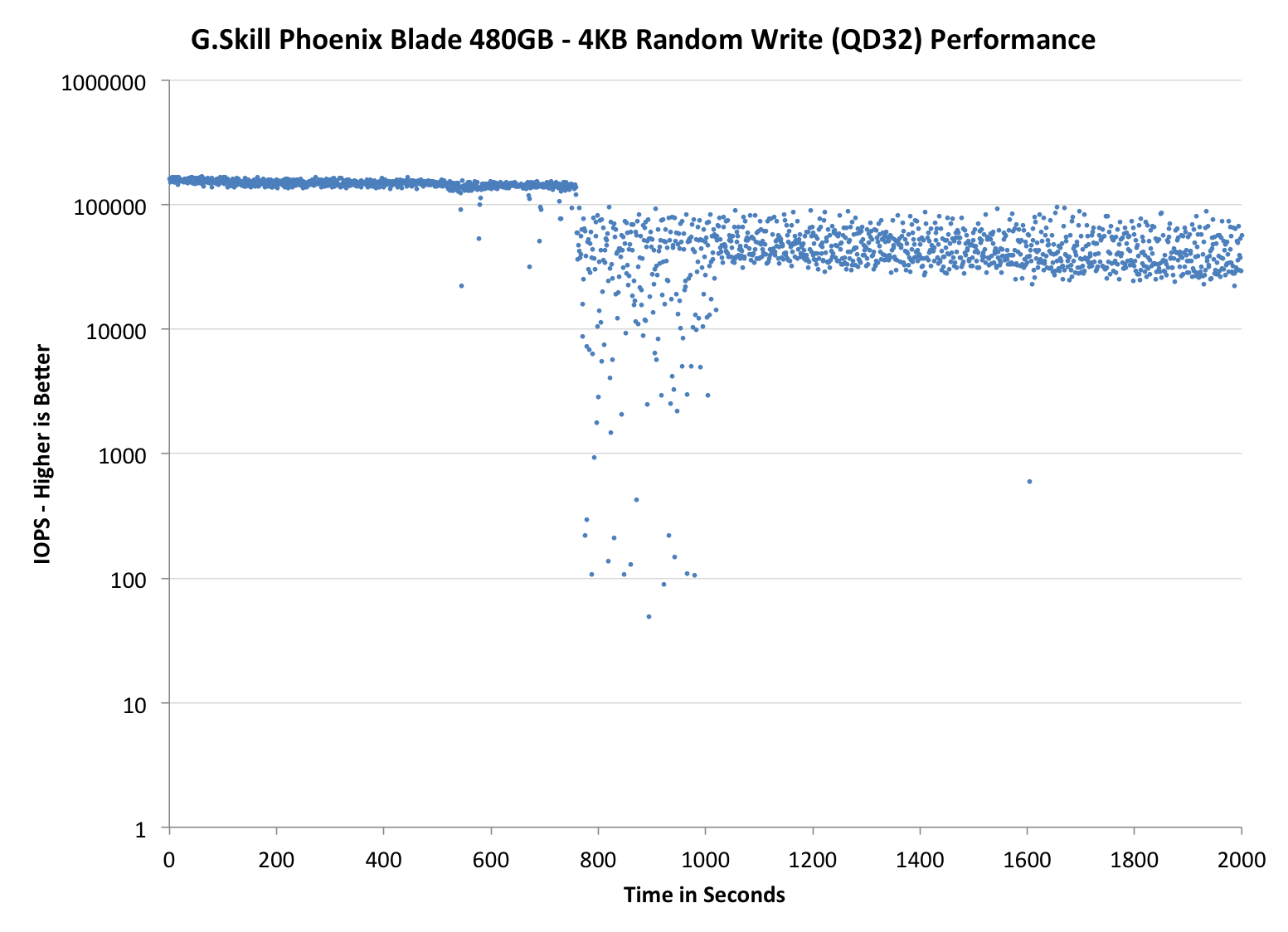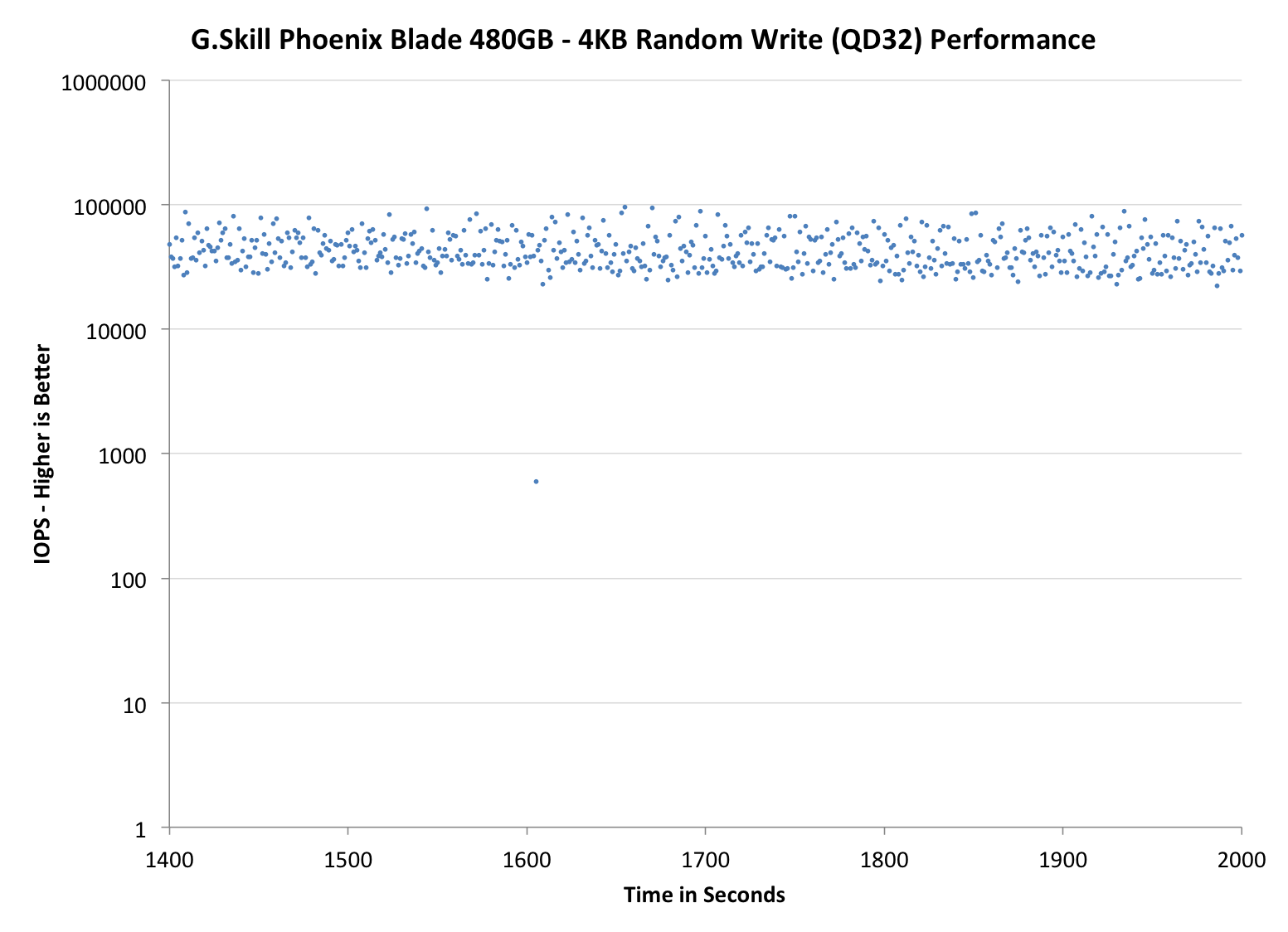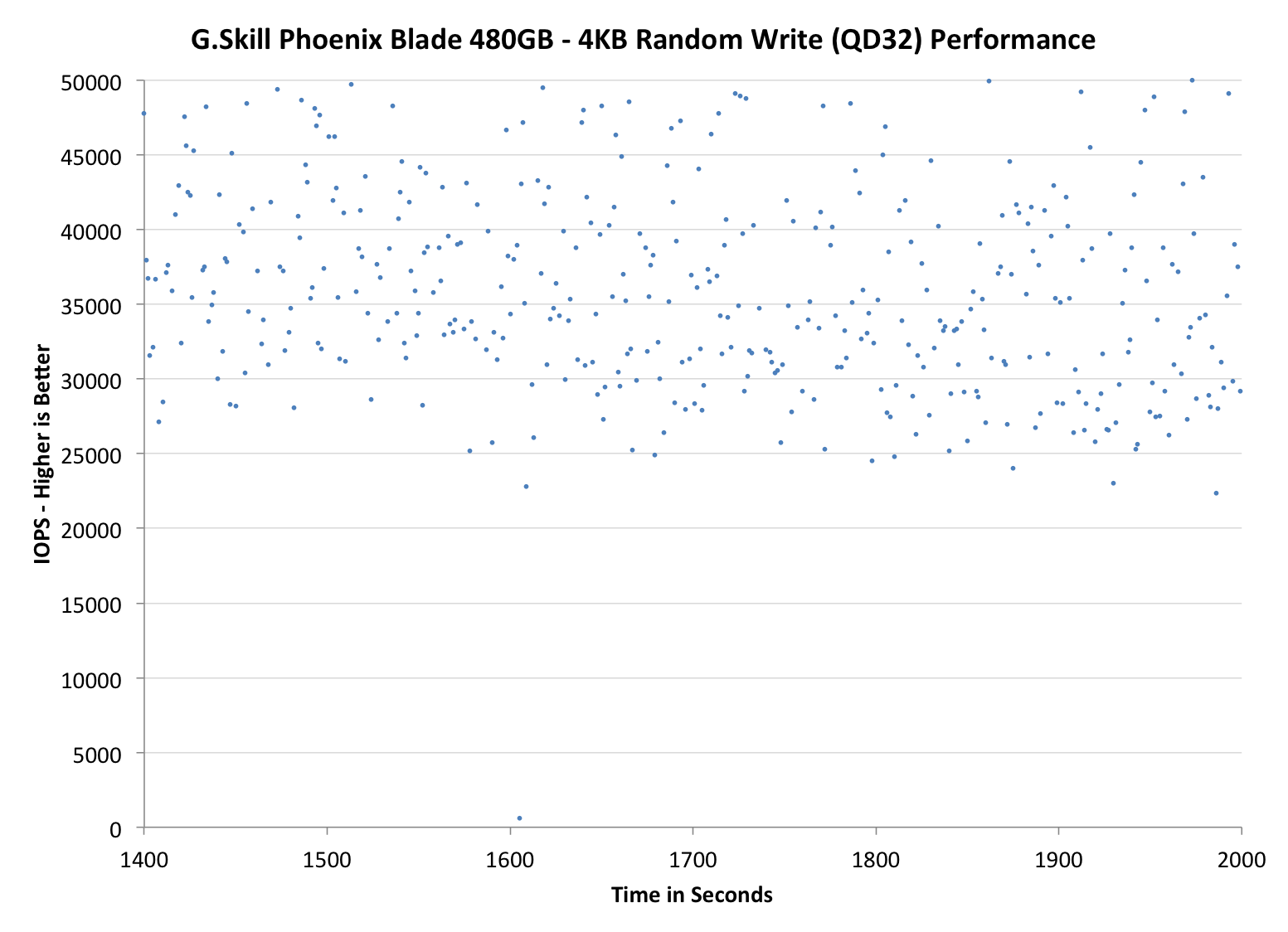G.Skill Phoenix Blade (480GB) PCIe SSD Review
by Kristian Vättö on December 12, 2014 9:02 AM ESTPerformance Consistency
Performance consistency tells us a lot about the architecture of these SSDs and how they handle internal defragmentation. The reason we do not have consistent IO latency with SSDs is because inevitably all controllers have to do some amount of defragmentation or garbage collection in order to continue operating at high speeds. When and how an SSD decides to run its defrag or cleanup routines directly impacts the user experience as inconsistent performance results in application slowdowns.
To test IO consistency, we fill a secure erased SSD with sequential data to ensure that all user accessible LBAs have data associated with them. Next we kick off a 4KB random write workload across all LBAs at a queue depth of 32 using incompressible data. The test is run for just over half an hour and we record instantaneous IOPS every second.
We are also testing drives with added over-provisioning by limiting the LBA range. This gives us a look into the drive’s behavior with varying levels of empty space, which is frankly a more realistic approach for client workloads.
Each of the three graphs has its own purpose. The first one is of the whole duration of the test in log scale. The second and third one zoom into the beginning of steady-state operation (t=1400s) but on different scales: the second one uses log scale for easy comparison whereas the third one uses linear scale for better visualization of differences between drives. Click the dropdown selections below each graph to switch the source data.
For more detailed description of the test and why performance consistency matters, read our original Intel SSD DC S3700 article.
 |
|||||||||
| Default | |||||||||
| 25% Over-Provisioning | |||||||||
Even though the Phoenix Blade and RevoDrive 350 share the same core controller technology, their steady-state behaviors are quite different. The Phoenix Blade provides quite substantially higher peak IOPS (~150K) and it is also more consistent in steady-state as the RevoDrive frequently drops below 20K IOPS while the Phoenix Blade doesn't.
 |
|||||||||
| Default | |||||||||
| 25% Over-Provisioning | |||||||||
 |
|||||||||
| Default | |||||||||
| 25% Over-Provisioning | |||||||||
TRIM Validation
To test TRIM, I turned to our regular TRIM test suite for SandForce drives. First I filled the drive with incompressible sequential data, which was followed by 60 minutes of incompressible 4KB random writes (QD32). To measure performance before and after TRIM, I ran a one-minute incompressible 128KB sequential write pass.
| Iometer Incompressible 128KB Sequential Write | |||
| Clean | Dirty | After TRIM | |
| G.Skill Phoenix Blade 480GB | 704.8MB/s | 124.9MB/s | 231.5MB/s |
The good news here is that the drive receives the TRIM command, but unfortunately it doesn't fully restore performance, although that is a known problem with SandForce drives. What's notable is that the first LBAs after the TRIM command were fast (+600MB/s), so in due time the performance across all LBAs should recover at least to a certain point.










62 Comments
View All Comments
Supercell99 - Friday, December 12, 2014 - link
Did we ever found out about the endurance of the XP941? Is it artificially limited? The endurance of the GSKILL blade may actually make it worth an extra $200 if it can really hold up to that can of write endurance. http://www.anandtech.com/show/8006/samsung-ssd-xp9...Dug - Friday, December 12, 2014 - link
Ahh ok. Thank you for the response. My fault for not understanding the weight attributed to a certain benchmark.olderkid - Friday, December 12, 2014 - link
Any idea if we're going to see the Samsung SM951 anytime soon? It's all I've been waiting on for a new x99 build.Laststop311 - Saturday, December 13, 2014 - link
Bro i KNOW! I have been on the lookout for sm951 for a long time. When I saw this drive was going to be native pci-e 3.0 x4 m2 ssd + nvme + available in 1TB capacity I was like OMG this is my new drive I dont care what the price is it's 100% goin into my next build. That was like almost 6 months ago or something and still no word. I'm rly sad I hope it is still going to come out.I am not building till Skylake-E so i still have plenty of time. Even tho I am on gulftown i7-980x which is over 4 years old goin on 5 years it still isn't slow enough to be a bottleneck especially on 4.2Ghz OC. Not even upgrading for the cpu just for features I want like DDR4, PCI-E 4.0, ultra m2 slot, sata express, usb 3.0 that isnt from a third party controller (yes I don't have native usb 3.0 still). I still might buy somethign else other than a pc upgrade. This year I bought a 55" oled LG's 2nd gen 55" oled instead of a pc upgrade ( best decision ever it is eye searingly beautiful).
Laststop311 - Saturday, December 13, 2014 - link
3000 for 55" oled = WINpersonne - Friday, December 12, 2014 - link
I'm disappointed no RAID0 SSD setups were included. That's a cost effective option many people will explore which often has comparable performance. Three 850 Pros for 768GB is still less than this device.HoldDaMayo - Friday, December 12, 2014 - link
Well said, I was thinking the exact same thing.Kristian Vättö - Friday, December 12, 2014 - link
I don't have any sets of two drives, so I couldn't include any RAID 0 results here. I may provide an update later if I get my hands on some, though.personne - Friday, December 12, 2014 - link
I've often wondered why these kinds of review sites don't keep databases of results. I realize that the benchmark suites change and you're not a huge operation, but even having recent results to compare openly (using your own front end or even releasing open data) would really up this game and enable your users to participate better. I don't want to sound harsh, but it's 2014, reviewing sites have been around for yearly twenty years and they have changed little in format. Anandtech is easily one of the best, but many sites come down to a few pictures of results and some fairly arbitrary comments (Storage Review is one exception; since the start they've had a database where results can be arbitrarily compared). I hope sooner or later Wikipedia and other collective open benchmarking sites will start elevating comparison and I'd hope to see sites like Anandtech leading the way.Thanks for listening. (=
Kristian Vättö - Friday, December 12, 2014 - link
Well, we've had the Bench section with all of our benchmark data for as long as I can remember.http://www.anandtech.com/bench